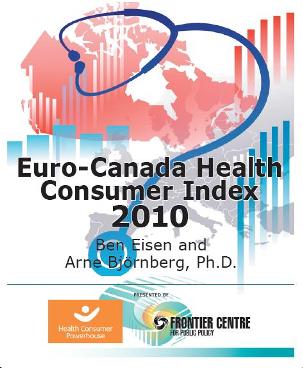 This is the third annual Euro-Canada Health Consumer Index (ECHCI). The ECHCI is an international comparison of healthcare system performance in 34 countries. All 27 European Union member states are examined, along with Norway, Switzerland, Croatia, FYR Macedonia, Iceland, Albania and Canada. For the third straight year, the Netherlands finishes in first place in the ECHCI, earning 857 out of 1,000 possible points.
This is the third annual Euro-Canada Health Consumer Index (ECHCI). The ECHCI is an international comparison of healthcare system performance in 34 countries. All 27 European Union member states are examined, along with Norway, Switzerland, Croatia, FYR Macedonia, Iceland, Albania and Canada. For the third straight year, the Netherlands finishes in first place in the ECHCI, earning 857 out of 1,000 possible points.There are several factors that enable the Dutch healthcare system to score highly each year in the ECHCI. Perhaps most importantly, the Netherlands is characterized by competition between many different healthcare insurers, which are organizationally independent from healthcare providers. This enables competition and consumer choice that helps create a consumer-oriented healthcare system.
The purpose of the ECHCI is to provide an evaluation of healthcare system performance from the perspective of the consumer. In many areas of public policy, healthcare included, performance evaluation is often based on the measurement of inputs and certain types of easily measurable outputs that do not necessarily reflect the effectiveness of the relevant program or policy. Counting resource inputs such as hospital beds and doctors per capita does not tell us very much about the care that consumers actually receive; the amount of time the average person has to wait for an MRI is a much better indicator of healthcare quality than the number of MRI machines in a particular country.
Instead of measuring inputs, such as spending levels and resources used, this index attempts to measure outcomes from the perspective of the consumer. The ECHCI seeks to measure the consumer friendliness of each national healthcare system and should not be interpreted as an attempt to identify the “best” healthcare system.
Our analysis of the performance of the 34 countries in this index shows that performance tends to be higher in countries that are organized around the “Bismarck” model than in those that are organized around the “Beveridge” model. This means that healthcare systems that allow competition between insurance providers, and in which insurers are organizationally independent of healthcare providers, tend to be the top performers. The Beveridge model, of which Canada is an example, uses a single organizational system that includes financing bodies and providers and does not offer choice between insurers. This model generally tends to create inefficiency, unwieldy bureaucracy and a general unresponsiveness to consumer needs.
This year’s report shows that Canada still has a long way to go to catch up to Europe’s top performers, but it also brings some hopeful news to Canadian healthcare consumers. Canada shows evidence of improvement: Canada’s score improved in four of the five categories of indicators (sub-disciplines), and remained unchanged in the remaining category. Canada still dramatically underperforms when compared to top countries such as the Netherlands and Denmark, but this report provides grounds for cautious optimism that Canada is taking steps in the right direction.
In this year’s report, Canada finished in 25th place of the 34 countries analyzed. This is a similar placement to last year, when Canada finished 23rd of 32. This lack of progress in ranking should be a point of concern, however it should also be noted that Canada improved its total score by 45 points, due to improvement in the patient rights, wait times, outcomes and range and reach of services categories.
Despite this progress, Canada still has substantial room for improvement. Sections five and nine provide a more detailed description of Canada’s performance for each subdiscipline and indicator, and the following notes present a brief overview of Canada’s performance in this year’s ECHCI.
Canada’s performance Overall:
• This year’s report shows that Canada still has a long way to go to catch up to Europe’s top performers, but it also brings some hopeful news to Canadian healthcare consumers.
• Canada’s score improved in four of the five categories of indicators (sub-disciplines) and remained unchanged in the remaining category.
• Canada’s overall performance improved, but not enough to enable Canada to pass other countries to move up in the rankings. Canada finishes in 25th place of the 34 countries analyzed in this 2010 index. This is a similar placement to last year, when Canada finished 23rd of 32.
View entire study as PDF (48 Pages)